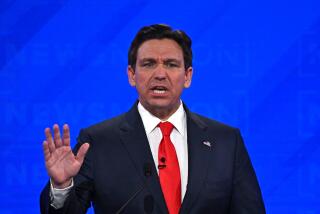‘Weird’ Year in Politics Leads Bush Down Unusual Paths
- Share via
DOVER, Del. — On Saturday, he was scrambling across Florida, from a condominium near the Gulf of Mexico to hurricane-stricken Homestead to a rally in a reconstructed saloon in Orlando.
On Sunday, he gave in to the talk-show medium so favored by his opponents this year and sat down in the White House for an hourlong interview on CNN’s “Larry King Live.” Less than 12 hours later, he was back on the airwaves, this time subjecting himself to his fourth interview on a morning television news show in eight days.
And on Monday, the President of the United States, seeking support in every possible state, was here in the capital of the nation’s second smallest state, which offers all of three electoral votes as its prize on the Nov. 3 election.
In what he calls a “weird” year, George Bush is doing weird things and going to weird places--weird that is, for an incumbent Republican President.
His visit to Delaware--traditionally off the beaten path for presidential candidates of either party--provided a stage for an outdoor rally on a glorious autumn day, a sharp attack on the care of children in Arkansas during the years Bill Clinton has been governor there and, perhaps in a slip of the tongue, a rare suggestion that the Democratic nominee may just win the White House.
“He ought to stop attacking me and try to help the good people of Arkansas before he becomes the President,” Bush said.
The attention Bush has devoted in the last few days to Delaware and Florida--two states he carried easily in 1988--and his willingness to play the campaign game on television talk shows reflect the difficult fight he has on his hands four weeks before the election.
Indeed, the discouraging status of the electoral map, as seen by the Bush camp, is further reflected by the President’s schedule this week.
He plans to return for at least two days to his adopted home state of Texas, a state that has become crucial in his strategy because its 32 electoral votes can help offset his anticipated loss of California’s 54 votes.
Overall, Bush’s travels over the last two weeks have taken him to more than a dozen states, most of which were firmly in the Republican column in the 1980s. Four years ago, for instance, Bush found no need to visit Florida after late July.
In seeking to solidify his base, Bush has focused much of his fire on various aspects of Clinton’s gubernatorial record over the last decade. On Monday, the 270-year-old green in front of the Old Statehouse in Dover offered the President a sunny setting for another of these attacks, this one in the area of children’s health.
Bush said that in 1987, Arkansas had the eighth-highest death rate for children under the age of 14. Two years later, it was ranked No. 2, Bush said.
The President also said that during the 1980s, while Clinton was governor, the rate of violent deaths among teen-agers in Arkansas climbed at three times the national average and that child abuse reports increased by 130%.
“Despite that record, the governor travels the country calling himself an advocate for children,” Bush said. “Well maybe the children of Arkansas would be better off if he spent less time talking about it and more time trying to help them. They deserve better. The children of America deserve better.”
He added: “Let him straighten out Arkansas before he tries to be President of the United States.”
Clinton communications director George Stephanopoulos responded to Bush’s criticism by attempting to turn the tables. Stephanopoulos said the President’s domestic policy had neglected the nation’s children and that now he is “trying to paint a different picture on the campaign trail.”
More to Read
Get the L.A. Times Politics newsletter
Deeply reported insights into legislation, politics and policy from Sacramento, Washington and beyond. In your inbox twice per week.
You may occasionally receive promotional content from the Los Angeles Times.










